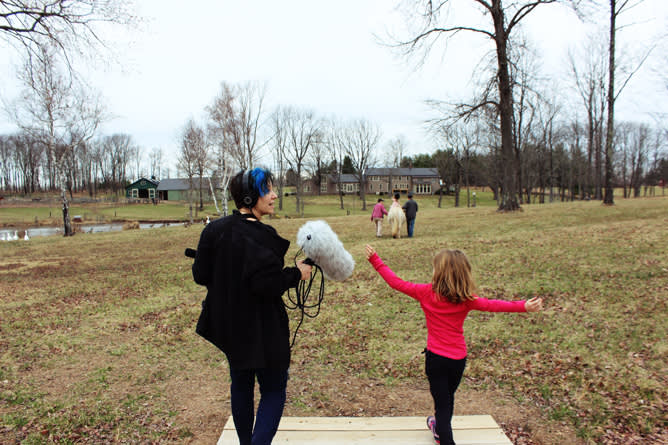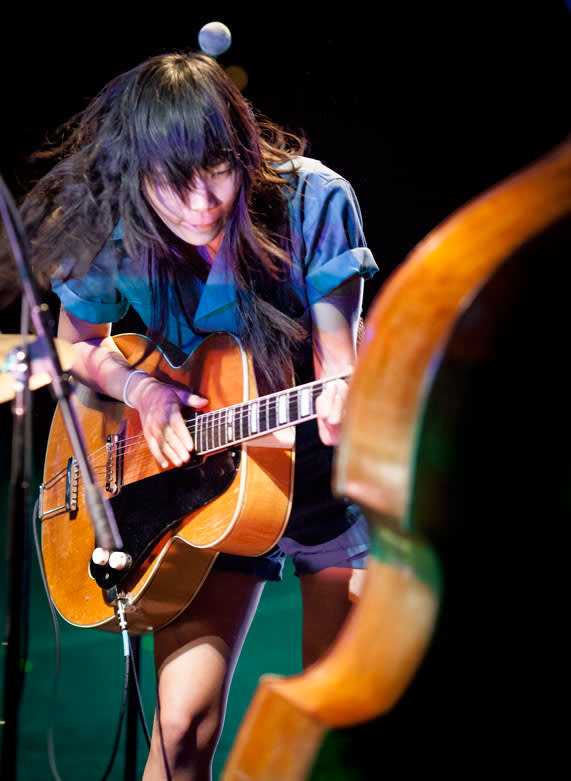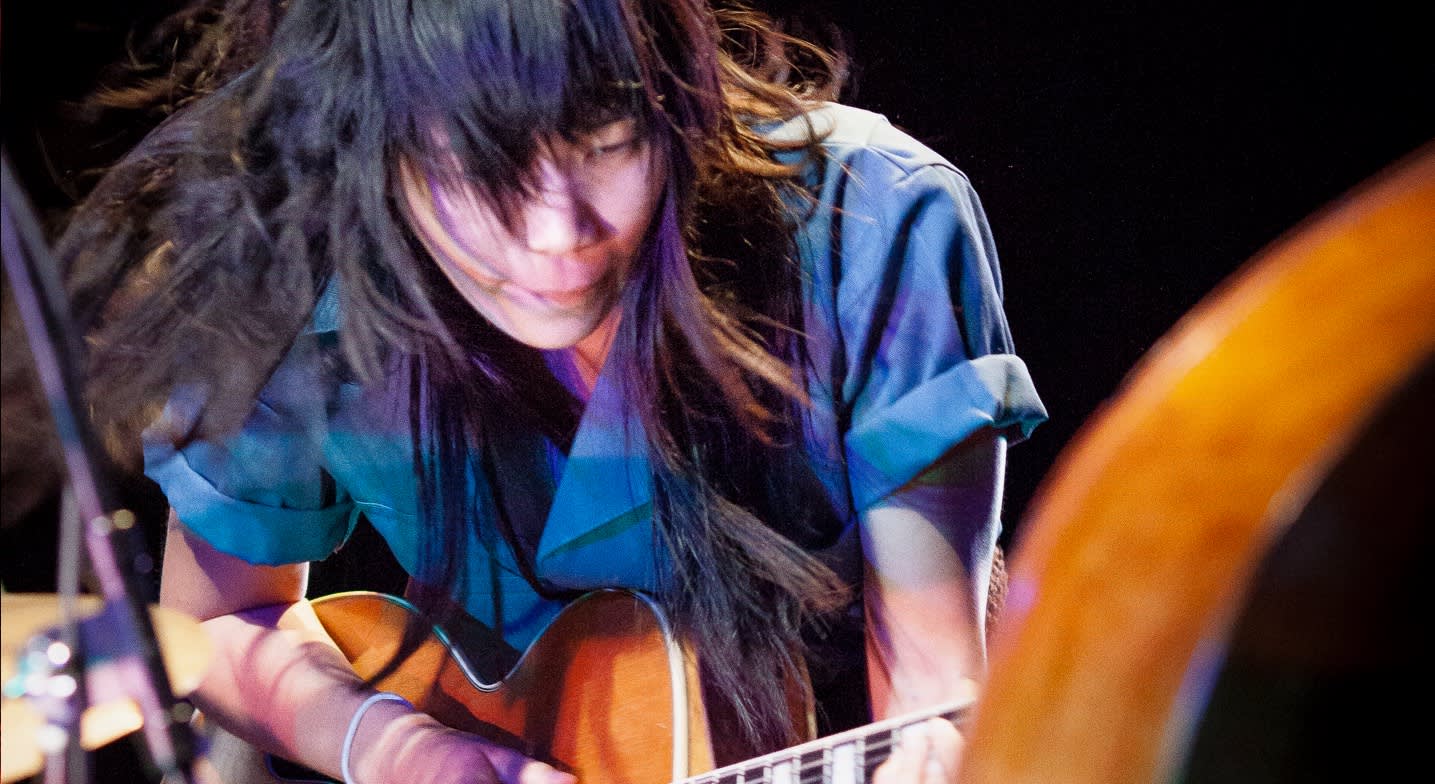In January 1967, Aretha Franklin kicked her Columbia record contract to the curb.
Six years earlier, DownBeat magazine had crowned her a “new-star female vocalist,” but she was recording songs that sounded like this, and she hadn’t really broken through. So she got a new producer, signed with a new label, and took a trip to Muscle Shoals, Alabama. There, she met a team of musicians and made this. Now that sounds like the Queen of Soul.
I wonder if Aretha Franklin would be a household name without Muscle Shoals. Some of the world’s biggest musical acts of their day came to this backwater Alabama town to record, hoping to tap into the powerful and authentic groove emanating from this place, these people:
The music that came out of that place was inimitable — driving and funky, sexy and soulful — and the list of hitsmade there is mind-boggling.
Why do some teams, some studios, just click and make magic — and then go on to do it again and again? This question has been on my mind as Audible wades into creating original content.
While we aren’t making music here at Audible, we are launching a brand new sort of recording studio for original audio content — audio programs not adapted from a book or pre-existing text. As we bring together producers, journalists, writers, and performers, and build new recording facilities, I am aware of how these initial decisions can have a profound effect upon the things we make. “Aural terroir,” let’s call it. Terroir, to borrow a winemaking term, is the name for the impact of soil and climate: It is the taste of place.
For every new Audible Original project, from multi-part documentary series to audio fiction, and the dozen-plus harder-to-categorize projects in between, my first questions are always: What does this sound like? What does it feel like? How fast does it move? How dense is it?
As executive producer, most of the time I’m assembling a team of producers and creators to figure out the best way to bring a project to life. Only rarely is the show my idea in the first place. Usually, I’m like a midwife helping the creative project achieve a safe birth. But there are times when I’m down on my hands and knees myself, pushing and panting … cutting tape, writing copy, interviewing people, and sound designing.
Of course, things like Aretha Franklin recording in Muscle Shoals don’t really happen randomly. This tiny Alabama town had made a name for itself by cutting albums with Percy Sledge and Wilson Pickett before going on to record Otis Redding, Bob Dylan, the Rolling Stones, and Lynyrd Skynyrd. Culture evolves collectively, with each artist influenced by the sounds and styles that others have introduced or innovated.

Prior to coming to Audible, I spent 12 years at WNYC radio. When we launched Radiolab, I was obsessed with the question of how to make it sound different from the rest of what was on NPR, especially This American Life, the show that had inspired me. (I was by no means alone in that; This American Life spawned a whole generation of producers). Jad Abumrad, the show’s creator, and I thought of the Radiolabintro — that bit at the beginning composed of the stumbles and starts of the show’s producers; just listen to the first 30 seconds — as the sounds of planting the Radiolab flag. The sonic character of that opening, using voice as a musical instrument — not just in sound effects but also in the content, as voices woven together in a symphony — has become such a hallmark of modern audio production that you might not even recall the dominant style it displaced: slow, dulcet, melodious smooth talking. For example, listen to the type of hosted interview show parodied in the SNL “Schweddy Balls” skit.
Fast forward a decade, and you can hear the impact of Radiolab’s new sound, not just on the shows that former Radiolab staff and interns now make (such as Invisibilia, or Reply All), but take the first 30 seconds of the TED Radio Hour, for example. After launching Planet Money, Alex Blumberg even sent the Radiolab hosts a thank you email crediting us, acknowledging that they were cribbing our style with the way that he and Adam Davidson co-narrated the housing crisis analysis through dialogue.
However, early on, we received an enormous volume of hate mail from NPR listeners who found the intercut voices distracting, juvenile, or worse. Not everyone is on board with the idea of new sounds. Familiarity is comfortable, and not every innovation is for everyone.
I left Radiolab and public radio after more than a decade to come to Audible and produce original content. Audible is committed to pushing the boundaries of spoken word audio. It was an irresistible opportunity to be a part of that creative stretch. We are making short-form programs, some of which may be familiar in format, like interview shows, while other projects will hopefully sound like nothing you’ve heard before. Which brings us back to the crux of the creative problem currently keeping me up at night: How do we make something sound truly new?

I began to wonder if this wasn’t an analogous problem to that of a musician beginning a next album. You bring with you your past experiences, you are influenced by what others are making, but to get to a new sound, you need something more.
From my days as the Radiolab live show director, I’d gotten to know indie-musician Thao Nguyen. I called Thao and confessed that in my new role here at Audible, I was wrestling with the timeless creative question of how to push for innovation in my projects. Thao invited me to her apartment to sit down in front of her laptop and hear some demos of her new album.
You can listen to or read my interview with Thao, below. The thing about her new album is that it sounds more powerful, more like her true voice, than anything I have heard from her before. You can’t help but move — and be moved — when you listen to it.
I was struck by a few things in our conversation. We spoke at length about the pivotal role of her producer, Merrill Garbus, known as tUnE-yArDs. Merrill had been a deferential protector, making Thao’s desires and needs the priorities in the studio, but she also pushed and challenged Thao. The interplay of these two elements is key. Merrill gave Thao both creative control and a sense that she wasn’t alone, that they were both invested in the mission. From that space, Merrill could encourage Thao to move beyond her comfort zone.
Another significant lesson was that she had something to say. By focusing on her most painful personal content, Thao hoped to tap into a new power source. She had a need to connect, and she was ready to say it. Key in any great editorial project are these questions: Do we have something unique to say? What voices do we need to hear from to understand this, not just intellectually, but emotionally? And, finally, are those voices ready and able to speak publicly? Authenticity is the prime driver of emotional connection between creator and audience.

But the most important element of Thao’s new direction was that it wasn’t really new. She’d found the confidence to listen to her own voice more closely than ever before, to give it more space and prominence, and that allowed her to push her sound to the next level. To interpret her own ideas with certainty. And to have a team around her that would offer her unfettered support, even when there was disagreement, unleashing the power of her own, true voice.
Listen to (or read) my conversation with Thao Nguyen below.
I sat down with Thao Nguyen, who I toured with and directed for Radiolab’s “In The Dark” theatrical tour. Thao’s latest album was produced by Merrill Garbus of tUnE-yArDs. Her new album, A Man Alive, sounds really different than her other albums, and yet its newness doesn’t sound like an external factor, painted on, but rather like something more raw and interior — more her than she has ever been. I wanted to know what it took for her to get there.
Ellen Horne: How did you know when you were going in the right direction?
Thao Nguyen: I knew from the making of the last record that I wanted to move more into a beat-and-bass-driven sound.
EH: Was that just, like, an arbitrary direction that you were going or … were you inspired by something in particular?
TN: I think that I’ve always just been more interested in being a drummer. I don’t really play the drums and I wish that I had started when I was young … I just have more appreciation for beats than I do for melodic, chordal things.
EH: So it feels closer to your nature?
TN: It does! It’s so funny because I’d never tuned into that. For a long time I was the only woman in the group of dudes, all of which had very strong opinions … the producer and the rest of the band. I was young enough that I just wasn’t fully formed in my confidence and my belief in my own decision-making, belief in my instinct. And my friend Merrill [Garbus of tUnE-yArDs], who is incredible and we’ve been friends for years, she’s witnessed that plight for a long time … she was there during sessions, and just kind of like, this “dude” vibe is really strong.
EH: Did she talk about that with you?
TN: We did talk about it. But it’s sort of a thing you have to sort out on your own. You know, you make your own peace with it. Or you confront it in your own time.
EH: Yeah, yeah.
TN: And so, with the making of this record, I had first wanted Merrill to produce a track because we were in talks with other people [to produce the album] — and then, Joe, our manager, was like, why not the whole record? Schedule-wise, I didn’t know if it would make sense, and I didn’t know if she would really be up for it … but she was really excited about it and then we were able to make it work and it was this incredibly freeing experience.
“There are some [songs] that are just so vulnerable and very straightforward in a way that I have never trafficked in before.”
EH: Specifically, what was different from different producers? Other than just feeling safe…
TN: That’s the main thing she knew, going into the record, what I wanted the process to be. And, she herself, also being a songwriter, also being a performer, knowing that entire thing, and knowing what it’s like to be a woman making a record and touring it. It was this … the priority was whatever I wanted when [I wanted it]. But fully respectful of everyone else’s creative business and fully respectful of their participation. She was the steward, but just making sure that I had the reins … sort of working as my, what would you [call it?] … “fixer”?

EH: I can’t even tell you how helpful this is.
TN: Yeah? Awesome.
EH: Thinking about the way that you protect and create creative space is kind of my job. I’m basically a midwife to people’s creative process.
TN: I was trying to think of the term — like, a fixer? An emissary? A midwife! The facilitator. But also, you know,with her varied elements of expertise within the production element. But I do think that the most important thing was that she helped me be fearless. In the songwriting, in whatever sonic direction. You know, I’m not a drummer but I’m drumming on the record. I’m not a bassist but I’m playing bass. Just that freedom it’s so easy to do and yet I had not at that point experienced it for a studio record. To do it that way was amazing.
EH: Was it more that she gave an unfettered support and priority to you, or did she elicit that somehow?
TN: Both. Especially with the content of the songs. There are some that are just so vulnerable and very straightforward in a way that I have never trafficked in before. Where I wrote it, but thought, This won’t make the record. I don’t want it to be on the record. And then she would say this has to be on the record, because it embodies this element that is so central to the theme of the record, to the emotion of it. And that everyone felt pushed and challenged to explore different sonic avenues and to do things that they’d never done on a record.
EH: Is [Merrill Garbus] like that on every project?
TN: She’s like that for all of her projects.
EH: How long did it take to fully write and record?
“I do feel like I have this limitless well of rabid animal or something…and I wanted the chance to be even more free onstage.”
TN: I would say within a year everything was done, from inception of songs to the recording of them. I often take issue with my discipline for writing. (Laughs) I always think I’m going to start sooner, but it never fucking happens that way and I am always last minute: the studio date is scheduled. It’s already paid for, so if I don’t have a song, or however many songs…
EH: I can’t even tell you how many times I’ve had this conversation with creators, where I believe the deadline makes the work.
TN: It’s the only thing…
EH: …like you have to set circumstances up, because otherwise nothing would be good enough or ready.
TN: Right. I do think a lot of it is the stress, and every time I say I’m never going to do it like this again because it’s so stressful, and I hate myself … but that is part of it. It has to be … I’ve done it enough times now, I can’t do it another way.
EH: Right, you try to come up with some system for how you would trick yourself to not do it that way but…
TN: And I have asked [my manager] Joe to just set deadlines.
EH: Yeah, but if you know that they’re fake deadlines … ?
TN: Yeah, they’re relatively false and arbitrary and they can be moved … they’re flexible. I need to know that the record is releasing this date. And we’ve already paid and there’s noother option, you can’t reschedule this date. And then I’ll do it.
EH: It’s an album about your father?
TN: It’s an album about my relationship with him, directly and indirectly, but for the most part it’s, like, very directly related.
EH: So, how much can you tell me about that?
TN: Basically, I just started worrying that he would die, and that I would not have made any effort to be in touch with him. And I started to wonder about this estrangement that has existed, off and on, since I was probably eleven or twelve, where I can go years without talking to him, years without hearing from him, run into him, then years more. And, at this point, I haven’t seen him or talked to him in … oh god, I don’t even know … years.
EH: Right now?
TN: Right now.
EH: So does he know this album is about him?
TN: No.
EH: What’s it like for you to write a song, and then you create an album, and then you have to go out and tour it, and play those songs over and over again? Does that change how you approach the writing of it?
TN: It has. When I was reluctant or hesitant to be that vulnerable in the songwriting it’s because I knew I’d go do it in front of people.
EH: Oh my god, I can’t even imagine what a disincentive that is to do anything that’s slightly painful or vulnerable or whatever. It’s not that I’m just writing this and it’s over, it’s like you’re writing this and then you’re living it.
TN: I know, but then that became the propulsion and the compulsion for it, because I did … in a way, I wanted to interact on a level, live, where these strangers might see me cry. Because I felt, I think at this point, I’ve been doing this a while now, I realize that this — everything, especially this record — is an effort to communicate, if not with my dad, then just to communicate. The idea is to connect. I wanted to do it at a really high fidelity, you know? I think that I have a lot of pent-up whatever it is … I have a lot of energy and aggression and intensity when I get onstage, and it’s from a lifetime of not fully engaging … growing up in a house where you don’t talk that much, and no one talks to you that much, and having an entire emotional life that gets ignored. Or is under-recognized or appreciated. I do feel like I have this limitless well of rabid animal or something. It was time to really go there. And sonically I’ve wanted to go there, and I wanted the chance to be even more free onstage.
“There’s a lot of songs where, as I was writing it…I started crying. That’s very rare for that to happen.”
EH: Right, right.
TN: I say that now, because we haven’t really toured. We haven’t played a show with more than like two of the new songs. I do know that we were rehearsing one song — which didn’t make it on the record, but we were rehearsing it because we’ll probably still play it live — and I couldn’t get through it and I just … I was crying.
EH: Really?
TN: I was crying so much so that we had to, you know, everyone is like, “Umm, maybe we should we just take five?” I just caught myself unawares, you know, saying these lyrics. There are lines that say, “But I look like you completely now.” I don’t know if I can do that one live. But there will be moments. I’m sure. But at this point, it seems like a disservice to me, and for me, to not just go for it.
EH: Sonically, you said this is sort of a departure and that there are things that feel definitely much clearer and different from the past. Is that something that you can show me?
TN: Well one, funnily enough, is called “Departure.” And that’s written on mandolin but I knew from the beginning that it would be a deconstructed mandolin — heavily manipulated, affected mandolin sound — that would be a lot more fucked up and that I would want to play it in a much more powerful way than people consider mandolin…
EH: Yeah, mandolin doesn’t sound forceful.
TN: It doesn’t scream it, but this isn’t even the final version:
She plays an excerpt from an early demo from her laptop. As the music plays, she comments over the song.
TN: So that we have removed … all you hear of the mandolin right now it’s just that it’s keeping time, it’s just me on the bridge going tick tick tick, and that’s all that there is now. And then when you hear it, we’ve run it through a bunch of effects and pedals. And then, there’s some strumming. But we wanted this to be, like, a bootie jam.
EH: What did you say? You don’t … ?
TN: We wanted this to be a bootie jam. Even though, if you listen to the lyrics, it’s about abandonment. (She laughs.) Or, it’s about both of us abandoning. And this is on mandolin, that line…
A new voice sounds, it’s a piercing melody, but the instrumentation is hard to pin down.
EH: Oh, wow…
TN: …but also with guitar on top of it. But when I wrote that line, I wanted that to be a prominent lede line that would lead you from one section into the next, but if it were on another record it would have been just in the background, one of multiple things, because it was basically the rhythm track of the mandolin. I wanted the lines that I played much more prominently displayed than they had [been on other albums], and so I was writing for that.
A gritty, stripped down chorus and then an audible shift in the sonic composition to the verse.
TN: And now, the mandolin basically drops out for the verses; it’s not a true player, but it’ll come back in as a lead instrument, basically. And this is a lot more synths, a lot more drum machine, drum pads. And then more of an anthemic chorus. And this is the mandolin solo:
We hear a dirty, distorted, shredding, mandolin solo, practically an oxymoron in every way. Something totally uniquely Thao. You simply would not mistake this sound for anyone else. It is utterly and completely her sound.
I remember when I wrote this line — when you’re lucky, sections just come to you. They’re fragments but they come in whole … This this section, “My love won’t stay. Enough. Give it all away,” I remember this moment. I remember the moment it came to me because I started tearing up. And there’s a lot of songs where, as I was writing it, as whatever fragment visited me, I started crying. That’s very rare for that to happen.
Thao hits play again: “Send it all away.”
TN: And then “Meticulous Bird” is the one where that was Merrill’s challenge to write a song without an instrument. [Because] I had said that I wanted to rap on this album because I was making more beats, and I had wanted since I was young to be a rapper, and it had never worked out for a lot of reasons.
Thao plays the demo version of “Meticulous Bird.”
EH: Yeah, this sounds really different from what you’ve done before.
TH: I know. But it was like coming home in so many ways, because … I’ve always been such a fan of hip-hop and it’s influenced me so much, but I have never been able to pay tribute in a way that I wanted. This part:
The track reaches a frenzied state. Thao vocalizes (raps?) “Oh my! Oh my! Oh my! Oh!”
TN: That part’s special to me because, in a way, it embodies some of my mentality for this entire record and this new stage of my life. The line of “Oh my god, you didn’t know I get so ferocious.” I want to be able to do that live — I really look forward to losing my shit live.
EH: Oh my god, right? How cathartic!
TN: And then this song is about a lot of different kinds of abuses of power, and so there’s that aggression, too. It definitely is a different sound. It feels so comforting and comfortable, and very freeing.




